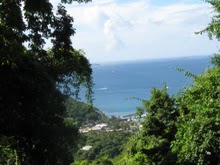 |
| Northern Flicker |
I was fortunate enough to get some shots of this bird in late September 2009. This is an incredibly bright and beautiful bird, and is actually a woodpecker who, unlike most woodpeckers spends much of it's time on the ground. Quite often it is seen perched on a branch rather than the trunk of a tree. It makes it's home all through North America, Alaska in summer and Central America, Cuba and the Cayman Islands. It is a bird after my own heart, as it seems to march to its own drummer, in that it is the only woodpecker to migrate, sometimes in large flocks.
There are five subspecies of this bird, with two types of
Northern Flicker
being the predominant. The eastern version, colored yellow, while the one in the picture to the left is the western, which has red coloring beneath the wings. Northern Flickers are predominantly brown with black bars, and a white rump and black tail. They also have a very clear red patch on the nape of their neck while their bellies are beige with spots, and sport a black bib like patch on their chests.
 |
| Looking up |
They feed on mostly insects, ants in particular with which they seem to also have a co-operative relation ship of sorts, as they have been observed letting ants crawl of over them. The theory is that the ants help rid them of pests. It is interesting to note that, just like an anteater, Northern Flickers have an extremely long tongue to help them feed on ants. If you wish to attract them to your backyard just install a suet feeder as they will feed on it, especially if your yard is populated with a few trees and bushes. Like all woodpeckers they will forage for bugs along tree trunks, and also occasionally feed on crickets, nuts, fruits and berries. Interestingly enough they have also been observed catching insects in flight.
 |
| Alert |
The Northern Flicker prefers open forests, groves and orchards and have been known to occupy city parks, and wooded backyards. They are known by alternate names such as Yellow hammer, Gaffer and Gawker bird. Being woodpeckers, they nest in tree hollows that they hammer out themselves, but will also occupy nest boxes created for them if they are of an appropriate size.
 |
| Northern Flicker back view |
If you wish to hear this bird's call or song go to this link:
http://www.all-birds.com/Flicker.htm and there is more information on this lovely species of bird at the following links:
http://sdakotabirds.com/species/northern_flicker_info.htm
http://www.seattleaudubon.org/birdweb/bird_details.aspx?id=279
In addition you can view videos at this link if you are so inclined:
http://www.squidoo.com/northernflicker
As you can see, although my abilities at photography is as yet somewhat limited, I did try to give you an all around view of this bird. Enjoy.
Susan












